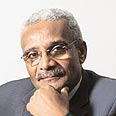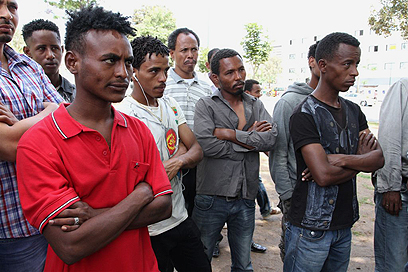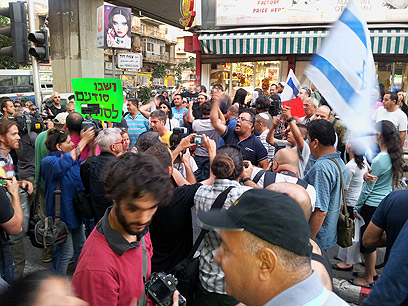
Eritrean Ambassador to Israel Tesfamariam Tekeste
צילום: ריאן
Gov't muddles through migrant question
Infiltrator, asylum seeker, refugee, illegal migrants; all words used to describe the influx from Africa. Yet definition could completely alter course of how State deals with what some have called an 'epidemic'
The debate over the classification of 60,000 African migrants who are currently residing in Israel is continuing at full throttle.
Israel's policy is to not deport the majority, some 53,000 who are mostly Sudanese and Eritrean. They receive temporary asylum accordance with the commitment to UN and international treaties that Israel is party too.
Related stories:
- Second anti-migrant protest sparks tension in south TA
- Netanyahu: Infiltrators a national threat
- Op-ed: Jewish view on refugees
The majority of foreign infiltrators who cross the border illegally are captured by the IDF and brought to the Saharonim facility in the south.

African migrants in Tel Aviv (Photo: Ofer Amram)
Those who identify themselves as Eritrean and Sudanese are questioned by the Population and Immigration Authority but their eligibility for refugee status is not examined. This, because if they are declared refugees, Israel will have to afford them rights and privileges of a refugee.
If their claims of Eritrean or Sudanese citizenship is confirmed they receive a 2A5 Visa, which clearly states that the permit does not constitute a work visa but in fact, in light of the State's commitment to the High Court from January 2011, the visa allows the foreigners to work and prevents their employers from being penalized until the construction of the holding facility is completed.
Foreigners who leave the Saharonim facility receive travel vouchers and most of them end up in southern Tel Aviv.
In a special interview given to Ynet, Eritrea's Ambassador to Israel Tesfamariam Tekeste called on his fellow Eritreans who are residing in Israel to return to Eritrea. "Those who wish to stay here can, but those who wish to leave – we say to them – you are welcome to come home. To those who return I say, your safety is ensured. This is your homeland, no one will hurt you."
According to the ambassador, "the infiltrators who come to Israel are seeking work. There is no political issue nor is it a matter of political prosecution, it is simply an economic matter. When they come here they say they are seeking asylum because they want to stay here and make good money. Some of them just want to avoid military service."

Anti-migrant protest in Tel Aviv (Photo: Moti Kimchi)
The ambassador noted: "If they really are asylum seekers or refugees, why are they crossing the borders of so many countries? According to the UN's definition, an asylum seeker must seek asylum from the first country they encounter."
Sharon Harel from the UNHCR paints a different picture. "It is true that when a person is seeking asylum they are supposed to request it from the first country they get to, but according to international law, in certain circumstances – if the first or second country are found to be unsafe because of their human rights record or due to the inaccessibility of their asylum seeking process – the asylum seeker may then cross the borders of more than two countries."
Professor Galia Tzabar from Tel Aviv University's Department of Middle Eastern and African History claims that the "situation is more complicated than that presented by the ambassador and (the one) presented by some human rights organizations."
According to the professor: "The Eritrean regime is tyrannical, centralized and undemocratic, one that does not respect human rights like the west. A regime that interferes in all areas of civilian life and under which the citizens suffer from lack of freedom and are obliged to (enter) military service for an unlimited period."
Yet Tzabar stressed: "Yet this is still not the most oppressive and violent regime in Africa or the world. The fact is that a group of Eritrean pilgrims visited Israel, and managed to afford the trip and return to their country. You can't paint an entirely grim picture of Eritrea."
On that matter Tzabar stresses: "There is a very thin line between escaping political persecution and seeking asylum to avoid poverty."
- Receive Ynetnews updates directly to your desktop










